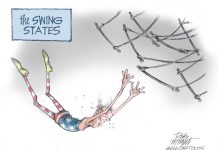Amid all the controversy during the recent push in New York and elsewhere for a $15 minimum wage, it’s important to remember the big picture.
In the decades after World War II, the United States had powerful policies and popular movements that lifted up working men and women. A third of employed Americans were members of unions, and a pro-worker lobby pushed Washington to raise the minimum wage to more than $10 in today’s dollars.
That culture has changed — so much so that today we’re even debating whether a worker should, at a minimum, earn enough to make ends meet.
No one is immune from the changes affecting the economy. American autoworkers, now in negotiations with the car companies, may take heart that their industry has rebounded.
But with more factory jobs moving to Mexico, entry-level auto jobs capped at much lower wages, and foreign automakers setting up shop in states that make union organizing hard, the future for the auto industry, and the manufacturing sector that paid so well, remains grim.
Meanwhile, the all-for-one, one-for-all attitude that the unionized autoworker voiced proudly has been pushed aside. Today, politicians talk about job-creating “makers” and parasitic “takers.” “Loser” and “fail” have become epithets of a society more tolerant of everything but low marks on test scores or performance reviews.
This attitude fed an intense self-blame among some of the unemployed people I met.
But this way of thinking is shortsighted. It’s based on a narrow moral viewpoint. If we only blame other people for failure and do not acknowledge the lack of opportunity, then it makes sense to tell people to just get an education and go it alone. If we care only about the number of jobs we create — rather than whether they are good jobs that can support families — then of course it makes sense to do whatever the company wants.
No one should be living in poverty if they work full time, period. This is about more than just economics. It’s about our values, which our economy is supposed to serve.
Victor Tan Chen, a former Newsday reporter, is a sociologist at Virginia Commonwealth University. This was written for Newsday.
Victor Tan Chen, a former Newsday reporter, is a sociologist at Virginia Commonwealth University. He is the author of “Cut Loose: Jobless and Hopeless in an Unfair Economy” and the editor in chief of In The Fray, an online magazine. This was written for Newsday.




